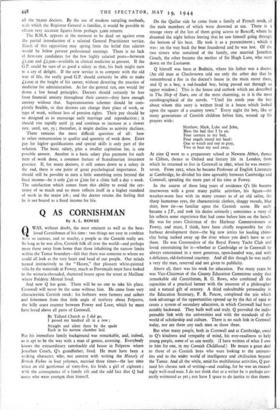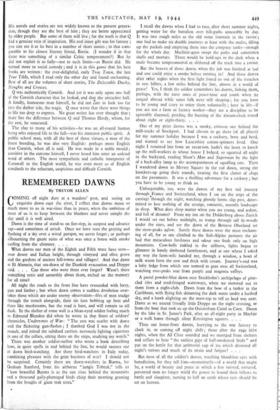Q AS CORNISHMAN
By A. L. ROWSE
QWAS, without doubt, the most eminent as well as the best- loved Cornishman of his time : two things not easy to combine with so curious, and so touchy, a people as the Cornish really are. So long as he was alive, Cornish folk all over the world—and perhaps more those away from home than those inhabiting the narrow limits within the Tamar boundary—felt that there was someone to whom we could all look as the very heart and head of our people. Our minds turned instinctively to the " Haven," that pleasant white-painted villa by the waterside at Fowey, much as Provencals must have looked to the wistaria-shrouded, shuttered house upon the street at Maillane where Frederic Mistral lived.
And now Q has gone. There will be no one to take his place. Cornwall will never be the same without him. He came from very characteristic Cornish stock: his forbears were farmers and sailors and fishermen from that little angle of territory about Polperro, the hilly coast country between Fowey and Looe, which he must have loved above all parts of Cornwall.
By Talland Church as I did go, I passed my kindred all in a row ; Straight and silent there by the spade Each in his narrow chamber laid.
But his immediate family background was remarkable, and, indeed, as is apt to be the way with a man of genius, arresting. Everybody knows the extraordinary ramshackle old house in Polperro where Jonathan Couch, Q's grandfather, lived. He must have been a striking character, who, not content with writing the History of British Fishes in four volumes, married three times—the last time when an old gentleman of sixty-five, his bride a girl of eighteen ; with the consequence of a family rift and the odd fact that Q had aunts who were younger than himself. On the Quilier side he came from a family of French stock, all the male members of which were drowned at sea. There is a strange story of the last of them going across to Roscoff, where he dreamed the night before leaving that he saw himself going through the bottom of his boat. He took it as a presentiment ; which it was : on the way back the boat foundered and he was lost. Of the two sisters who remained of the family, one married Jonathan Couch, the other became the mother of Sir Hugh Lane, who went down on the Lusitania.
Q himself was born at Bodmin, where his father was a doctor. (An old man at Charlestown told me only., the other day that he remembered a fire in the doctor's house in the main street there, and Q as a boy, a red-headed boy, being passed out through an upper window.) This is the house and outlook which are described in The Ship of Stars, one of the most charming, as it is the most autobiographical of the novels. " Until his ninth year the boy about whom this story is written lived in a house which looked upon the square of a country town." Every night the boy, like so many generations of Cornish children before him, wound up his prayers with:
Matthew, Mark, Luke and John, Bless the bed that I lie on. Four corners to my bed, Four angels round my head: One to watch and one to pray, Two to bear my soul away.
At nine Q went to a preparatory school at Newton Abbot, thence to Clifton, thence to Oxford and literary life in London, from which he returned to live in Cornwall in 1891, when he was twenty- seven. From 1912, when he became Professor of English Literature at Cambridge, he divided his time agreeably between Cambridge and Cornwall, spending the more part of his time at Fowey.
In the course of these long years of residence Q's life became interwoven with a great many public activities, his figure—the weather-worn face with its many creases as of an old sailor, the sharp humorous eyes, the characteristic clothes, shaggy tweeds, blue shirt, bow tie—so familiar upon the Cornish scene. He early became a J.P., and took his duties seriously ; sometimes a story of his reflects some experience that had come before him on the bench. He was for years Chairman of the Harbour Commissioners at
Fowey, and must, I think, have been chiefly responsible for the harbour development there—the big new jetties for loading china- clay being tucked away up the river where you don't have to see them. He was Commodore of the Royal Fowey Yacht Club and loved entertaining for it—whether at Cambridge or in Cornwall he always entertained in a most generous, open-handed way, and with a delicious, old-fashioned courtesy. And all this though he was really a very shy man, reserved and not given to publicity.
Above all, there was his work for education. For many years he was Vice-Chairman of the County Education Committee under that remarkable old Cornishman, R. G. Rows, who combined all the capacities of a practical fanner with the interests of a philosopher and a natural gift of oratory. A third redoubtable personality in the Education Secretary, F. R. Pascoe, completed the trio which took advantage of the opportunities opened up by the Act of 1902 to create a system of secondary education, in which Cornwall had been
notably backward. They built well and truly. Q provided the indis- pensable link with the universities and with the standards of the
world of scholarship and culture. There is no such link in Cornwall today, nor are there any such men as those three.
But what many people, both in Cornwall and at Cambridge, owed to Q's kindness and sympathy of mind, his ever-readiness to help young people, some of us can testify. (I have written of what I owe to him for one, in my Cornish Childhood.) He meant a great deal to those of us Cornish boys who were looking to the universi- ties and to the wider world of intelligence and civilisation beyond the Tamar. And all the while, amid his multifarious activities, Q pur-
sued his chosen task of writing—and reading, for he was an exceed-
ingly well-read man. I do not think that as a writer he is perhaps cor- rectly -estimated as yet ; nor have I space to do justice to that theme. His novels and stories are not widely known to the present genera- tion, though they are the best of him ; they are better appreciated by older people. But some of them will live ; for the truth is that Q had a genuine vein of inspiration. His real inner gift was for fantasy ; you can see it at its best in a number of short stories ; in that com- parable to his closest literary friend, Barrie. (I wonder if in that there was something of a similar Celtic temperament?) But he did not exploit it so fully—nor to such limits—as Barrie did. He turned more to social comedy ; and it is in this genre that his best books are written: the ever-delightful, early Tray Town, the late True Tilde, which I read only the other day and found enchanting. Best of all are the volumes of short stories, The Delectable Duchy, Noughts and Crosses.
Q was authentically Cornish. And yet it was only upon one half of the Cornish character that he looked, and that the attractive half. A kindly, humorous man himself, he did not care to look too far into the darker side, the tragic. Q once wrote that there were things in life too deep to express. No great writer has ever thought that ; there lies the difference between Q and Thomas Hardy, whom, for the rest, he venerated.
The clue to many of his activities—he was an all-round human being who enjoyed life to the full—was his immense public spirit. A public school man, with all the best of those virtues, a man of the finest breeding, he was also very English: perhaps more English than Cornish, when all is said. He was made in a noble mould ; sensitive in the extreme himself, I never heard him utter an unkind word of others. The most sympathetic and catholic interpreter of Cornwall to the English world, he was even more so of English standards to the reluctant, suspicious and difficult Cornish.



























 Previous page
Previous page